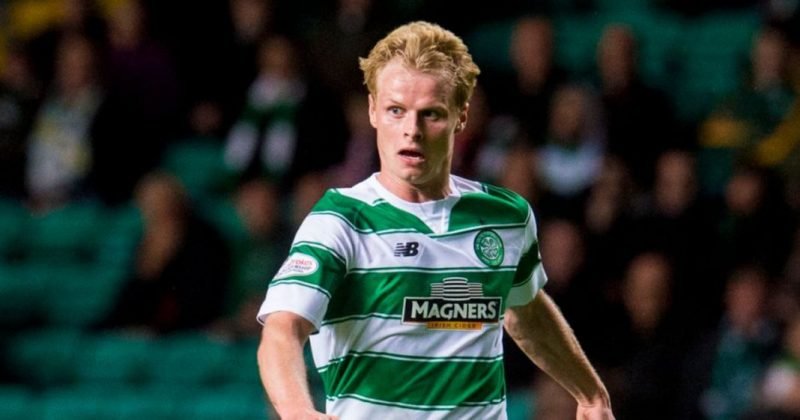Sometimes it is straightforward to spot the moment a player’s career at Celtic ends. The moment in which, while they still may don the green and white hoops, everyone knows that at some point they will be moved on.
For legendary Chinese bomb-scare Du Wei that, was the first time he was called upon to head away a long Clyde ball into his penalty area. For cult-hero Kris Commons, it was that infamous night in Norway where he allowed his passion to overcome reason. And, lastly, for someone like Nadir Cifti, it was the moment he penned his contract.
For the vast majority of other players, that moment where a Celtic Park career has been extinguished is much harder to decipher. One such player is the recently departed Gary Mackay-Stevens, although after much thought, and far too much time spent looking at his career, his terminal moment becomes apparent. It came in the 40th minute of Celtic’s Europa League second-leg match against Internazionale. Virgil van Dijk had just been shown a second yellow card for a soft foul on Inter’s Mauro Icardi, forcing manager Ronny Deila to shuffle his pack. After two minutes of contemplation, his sacrificial lamb was Mackay-Steven. It was a moment of bemusement for many fans. In the opening 30 or so minutes Celtic had managed to compete well but had largely been restricted to operations within their own half. The one player capable breaking beyond the Italians and providing some measure of an attacking threat was Mackay-Stevens. Darting runs, close control and faith in his own ability had ensured Celtic always had an out ball. His withdrawal for Efe Ambrose made little sense considering the Hoops still required an away goal if progression was to be made attainable. More palatable would have been the removal of Mackay-Steven’s former Dundee United team mate Stuart Armstrong, who at that point, had failed to scale the heights of which we now know he’s capable.
Without the means to alleviate pressure from the defence (Guidetti showed little willingness to break a sweat) Celtic were forced to defended deeper and deeper until the inevitable happened – an Inter goal. A stunning Freddy Guarin thunderbolt from around 25-yards.
From that moment Mackay-Stevens would not be the same swaggering presence he had been prior. The brash, confident winger that had more tricks than a Vegas showman would be replaced with a callow husk. A thin waif, lacking either the means or motivation to have his influence felt. With over 100 league appearances before joining Celtic, you would have assumed that he was too mature, too experienced for such a descent.
The following season was much more of the same for the blonde winger. He became a microcosm of the campaign; mundane, uninventive, linear football with penetration hard to come by if it wasn’t provided by the mercurial Leigh Griffiths.
There was to be some hope on the horizon, in the shape of Brendan Rodgers. Instead of the mass transfusion of playing staff that the fans had been clamouring for, Rodgers made it his mission to asses every player at his disposal, hope to salvage as many as he could and only dispose of those that he deemed unworthy. Some players were rejuvenated in an instant, like the captain Scott Brown. Others, like James Forrest and Stuart Armstrong were not far behind. Eventually, even Dedryck Boyata was rehabilitated. Sadly, there was to be no such Lazarus-like resurrection for Mackay-Steven, who despite numerous occasions to impress, was never able to wow the crowd.
His nadir came in the Scottish Cup tie against lower league opposition, St Mirren. Played on the right-hand side, time and time again his actions were met with a cacophony of despair. At his best that day, he looked like a competition winner and at his worse the torrid Jo Inge Berget, full of effort and application, yet woefully short of incisive quality. He left the field with Celtic losing 1-0 to be replaced by Paddy Roberts. The Englishman injected the game with a much-needed level of urgency leading to a belated 4-1 win. The chasm between where Mackay-Stevens was and where he needed to be could not have been wider.
Gary Mackay-Steven leaves this week to try and breathe new life into his career at Aberdeen. With a stable manager in Derek McInnes and a squad that is still the second best in the nation, the stage is set for a career revival.
With all the good will in the world, however, it ‘s hard to see him getting back to the level he so regularly hit before that night in the San Siro.
BEN DELANEY










Was it just this week he left us or was he not playing in Europe for the dons last week ?
Aye Charlie he made his debut for Aberdeen in that game. There’s definetly a player in there, so good luck Gary hope it works out for you. HH?
I agree, also hope it works for him up there he is a decent lad, just lacked a bit of conviction and self belief possibly, but as you say , very best of luck to the player
No need for such a break down on a player who tried his best and didnt work out.
Good luck to G M S
Sorry to see him gooo Wee will Re-great him going I thought GMS never got a chance but good luck to him ,there are players still at Celtic should be moved on before GMS hh ktf
Great piece; insightful and oddly moving. Heartening to see such artistry on a football blog.
Great wee player but did not have that “nasty” streak that was needed to put the tackle in. Best wishes GMS for the future. HH
Great potential, so sorry it didn’t work out for him, I wish him the best of luck for the rest of his career, it might be proven to be a wrong decision in the future.